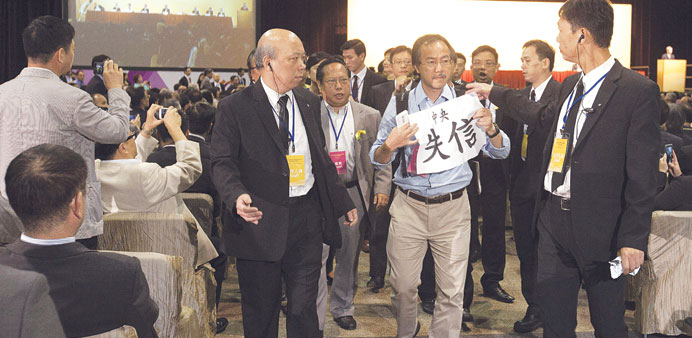Pro-democracy protesters are removed from the hall in Hong Kong where the Deputy Secretary-General of the Standing Committee of the Chinese National People’s Congress, Li Fei, was speaking about constitutional developments on the status of Hong Kong elections in 2017.
AFP/Hong Kong
Hong Kong pro-democracy activists yesterday heckled a top Chinese official, setting the stage for disruptive protests against the mainland’s landmark decision to limit voting reforms, but Beijing insisted that there would be no turning back.
Li Fei, a member of the top committee of China’s rubber-stamp parliament, was forced to speak over the cries of pro-democracy lawmakers and protesters during a meeting with local officials in the semi-autonomous Chinese city.
Brief scuffles erupted outside the venue as police used pepper spray to stop protesters from storming the hall, where Li told delegates that China will not tolerate a local leader who is disloyal to the mainland.
“Anyone who does not love the country, love Hong Kong or is confrontational towards the central government shall not be the chief executive,” he said.
His visit comes a day after democracy activists vowed an “era of civil disobedience” including mass sit-ins at the international business hub’s financial district in response to Beijing’s decision to grant only limited reforms in the former British colony.
Democrat lawmakers said yesterday they would sink Beijing’s proposal when it comes before the city’s legislature early next year.
“If it’s the same proposal decided by the NPC (China’s National People’s Congress) we will vote against it,” pro-democracy lawmaker Frederick Fung told AFP, adding at least 25 of his colleagues have signed a declaration to shoot it down.
The proposal needs to win two-thirds support - or 47 votes - in the 70-seat legislature to pass.
For years activists have agitated for the right both to nominate candidates and to vote for Hong Kong’s leader, a campaign buoyed by a recent surge in discontent over rising inequality and perceived interference by Beijing.
But their hopes were dashed Sunday.
The NPC standing committee announced that citizens will be allowed to elect their next leader in 2017 - but candidates must be chosen by a pro-Beijing committee and must win the backing of more than half of the committee members to stand.
Only two or three will be allowed to contest the election.
Democracy activists have called the restrictive framework a betrayal of Beijing’s promise to award Hong Kong universal suffrage by 2017 and say the nominating committee would ensure a sympathetic slate of candidates and exclude dissidents.
As Li approached the lectern to speak at the Asia World Expo convention centre, veteran dissident lawmaker Leung Kwok-hung started shouting him down, his fist raised in the air.
He was joined by a dozen pro-democracy lawmakers and some younger demonstrators who unfurled a banner and chanted: “The central government broke its promise, shameless.”
The meeting was briefly suspended while security officers removed the hecklers, to loud cheers and applause from pro-Beijing lawmakers.
Police confirmed they used pepper spray outside the venue when “protesters behaved violently”.
During an afternoon press conference, Li criticised the pan-democrats for heckling him.
“The door for dialogue has always been open. But this morning it was they (the pan-democrats) who refused to communicate,” he said.
Li flew to Hong Kong from Beijing late Sunday and was forced to drive past a crowd of largely student protesters gathered outside his hotel, in the kind of scenes that would be unthinkable on the Chinese mainland.
Britain handed Hong Kong back to China on July 1, 1997 under a “one country, two systems” agreement which allows civil liberties not seen on the mainland, including free speech and the right to protest.
Following Beijing’s decision to vet candidates, the pro-democracy group Occupy Central said Sunday it would go ahead with its threat to take over the city’s Central financial district in protest, at an unspecified date.
Shortly before Li’s speech activists launched what they described as a “slow drive” through the city, the first of a string of promised small-scale civil disobedience acts.
Some 10 cars, decked with flags, made their way deliberately slowly through the city accompanied by police motorcycles, but traffic was not noticeably disrupted.
Speaking to reporters, Leung called on the pan-democrat lobby to embrace Beijing’s proposal.
“It is something that we should all feel proud of and it is an opportunity we should all treasure,” he said.

